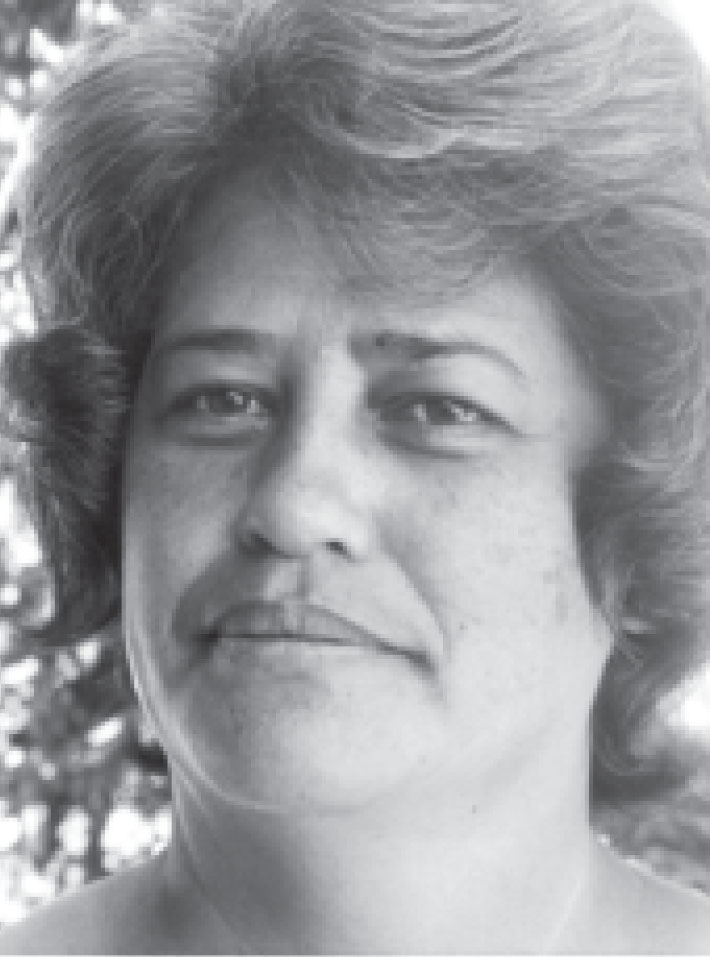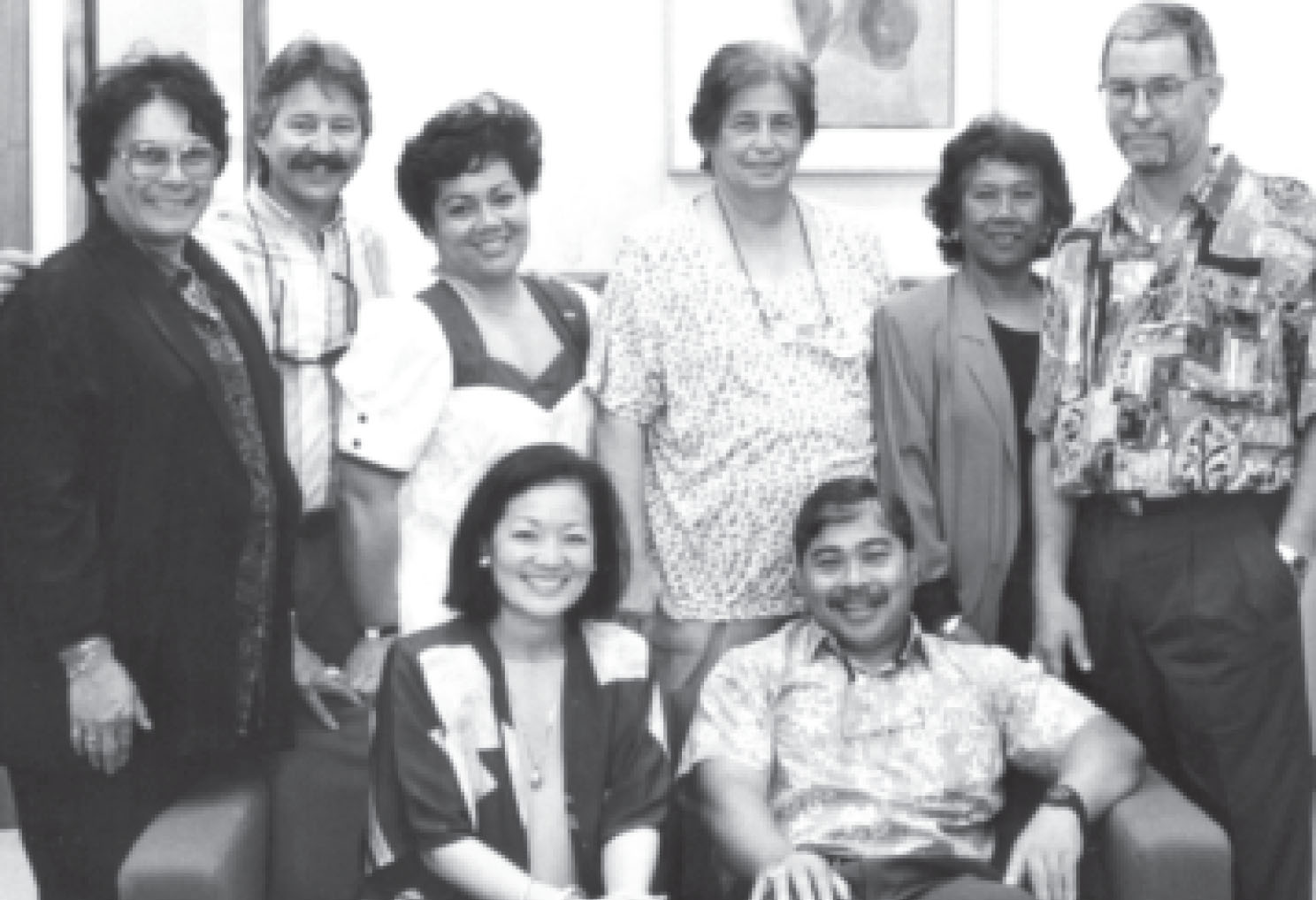
Edwina Byron Kaehulani Smythe, 67, of Kahului, died Feb. 13, 2007, at Maui Memorial Medical Center. Edwina helped the ILWU organize many of the hotels on Maui, was deeply involved in union political action, and was a strong and effective union leader.
Edwina became an ILWU member in 1968 when she started worked as a food and beverage cashier at the Kaanapali Beach Hotel on Maui. She became active with the union after the 1970 hotel strike, serving as unit secretary in 1970, as a member organizer from 1975, as unit editor in 1978, and as unit chair of the Kaanapali Beach Hotel from 1979 until her retirement in 2003. The unit has 220 members, and Edwina took care of the members of that unit like they were her family.
Edwina represented the tourism grouping on the ILWU International Executive Board from 1981 to 1983. She also served as the ILWU Statewide Hotel Negotiations chair and secretary. She was appointed by the ILWU Maui Division as a full-time officer in 1986.
As a hotel worker, Edwina was an effective organizer and was involved in a number of union organizing drives on Maui, Molokai, and the Big Island. She helped with organizing at the Molokai Sheraton, Kapalua Bay Hotel, Stouffers WaiIea Hotel, Sheraton Waikoloa, Mauna Lani Resorts, Maui Intercontinental, and the Hyatt Regency Maui in 1980.
Edwina was active in the union’s political action program and served as a member of the Maui County Planning Commission, Maui Historic Commission, Lahaina Community Plan, and Maui Aloha United Way Labor Liaison Committee.
Edwina Smythe was born Aug. 1, 1939, on Oahu. She attended Kamehameha School. She is survived by a son, Brett “Duke” Smythe; five daughters, Star (Wesley) Medeiros, Dawn (Derrick) Fujiwara, Crystal (Fuzzy) Alboro, Jasmine (Chris) Ryan and Melody Smythe; two brothers, Oliver Mullaney and Ronald Mullaney; three sisters, Leonie Russell, Elaine Mulaney and Eloise Kaiu; 20 grandchildren and four great-grandchildren. ◆
Remembering Edwina Smythe
At the March celebration of Edwina Smythe’s life, people remembered her as a mother, auntie, ILWU Unit officer, County Planning Commissioner, ILWU hotel industry negotiating committee member, and for the many other things she did in her life. She should also be known as a union organizer, as I remember her most vividly, and where all the facets of Edwina came into play.
She did contribute to the union in many roles. As a Unit chair helping countless members on the job and fully, vocally, participating in Maui Division Board meetings. As a fulltime Division Representative for a time, as a committee chair at statewide Local conventions. As a bridge for potential leaders– in the mid 90’s she was the only member of the multi-hotel negotiating committee that had been through the 1970 hotel strike. All this while golfing and, especially in the ‘90’s, immersing herself in her Hawaiian culture.

Edwina Smythe (standing, third from right) with Maui Division members and (sitting) then Lt. Governor Mazie Hirono and ILWU Local President Eusebio Lapenia Jr
She also directed convention delegates to have fun, and led by example. She did all this, but to me “union organizer” was her biggest and best role.
She was “blunt” (many other words have been used) and proud of it. More than one speaker at her memorial related how she included in her advice to them something like “don’t be stupid.” So many friends and family said “that was Edwina”, fondly in their memory, but may have felt pretty roughed up back when they went through it.
My standard joke back to people who where complaining about just being run through the wringer by Edwina was that they were in no position to complain. I’d claim first position because of spending 12 hours a day with her, week after week, month after month on the organizing trail, mostly going house to house in her small green car.
We were teamed together on the Maui Hyatt organizing drive, which spanned months because two elections were needed. We’d organized together on Molokai and on the Wailea Beach and Kapalua Bay hotels. Edwina was more on the Kapalua side and I on Wailea, but we interchanged.
John Arisumi, then a BA who also organized, ran those drives. They, Edwina, “Latty” Camara, Sharon Hong and Jerrybeth Demello who called him “father John”, were among core rank and file members who came out fulltime on organizing drives. He teamed us as off-island staff organizers with Maui hotel members. That’s when her daughter Star claims she was a teenager when she first met Guy Fujimura and myself.
So, to someone just reacting to being chewed up by Edwina, I’d joke “so what?” I had that every day. But you know what? She was always there. Always there to throw out her remarks, but also there for the union and our organizing team.
If we’d decided to leaflet the breakfast crew, she was there in the parking lot at 5:00 a.m. She was there if we went to talk to workers in the hot coral parking lot in the mid afternoon. She was there when we knocked on the last worker’s door at 8:00 p.m., or 11 p.m. at Wahikuli park if some food service workers had agreed to meet pau hana. These types of organizing drives mean putting aside one’s life for months at a time, and she did.
She might be criticizing and complaining all the way driving house to house. Then we’d get to a house. Nearly half the people she knew, especially on the west side. They might be long time local families, mainland “haoles” who worked hotels, family of Filipino immigrant workers at her hotel, or just people she got to know.
She didn’t know everyone though, and had to start “cold” with hundreds of workers. She connected with them as an experienced hotel worker, and… she knew her hotel contract inside-out! Edwina, using charm, knowledge and intelligence? One influential Swan Court (fine dining) waiter who committed to the ILWU cited intelligence and honesty during the house visit as the deciding factors for him.
She was a prototype communitybased union organizer, knowing who was related, where people worked a second job, everybody’s business. She knew someone delivering mail, who might know where workers lived.
More than once I’d be driving to a house for a follow up visit, and she’d say something like, “Where you going? He and his girlfriend broke up and he moved back with his mom.”
On those organizing teams Edwina and other member-organizers would stay with us off-islanders to eat our 9 p.m. dinners and get us back to whatever motel “father John” had put us in. We heard stories from the ’70 hotel strike. I wondered how many people who knew Edwina in different ways could imagine her crawling on her belly at night (as she described it) to put dye in a hotel swimming pool.
She was there. She didn’t just talk about how important organizing is, then decline when asked to come out on an organizing drive. When on a drive, she set aside other priorities, and stayed with it. During a visit with her at Hale Makua after her surgery, she said of the successful organizing drives, “We put them to bed, didn’t we?”
Whenever people recall her rough edges, or that not all her ideas were good ones, they must also admit that she did her talking as someone who was taking part, who was doing her part. This was a shared experience by the many who gathered at the celebration of Edwina’s life. These are some of the things I might have, or should have said. With all those people who knew her, more could have been said that can’t be written. For those who didn’t know her, particularly union members, her example is a good one – “be vocal, but don’t just talk, do it.” ◆
